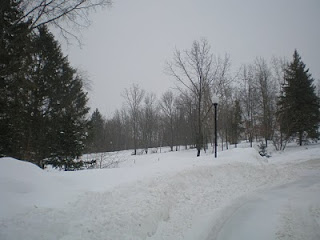Inspired by the final line of Mary Oliver's poem "A Dream of Trees," I intend this blog to be a forum for sharing musings on life as perceived through various physical and spiritual senses, and expressed through words and images.
Picture

Chestnut Hill Reservoir, Boston MA
27 February 2011
Architecture
Three Minutes

22 February 2011
Elevated

21 February 2011
Company Along the Way


15 February 2011
A Reflection on Regency
12 February 2011
Subtle Artistry
08 February 2011
06 February 2011
Light of the World



02 February 2011
Drifting Thoughts
- Shoveling out a 7-foot diameter crater around our community's bird feeder; the snow had gotten so high that the squirrels could just climb up onto the dome-shaped guard and pillage the feed intended for the many juncos and cardinals that patronize our seedy little establishment. (Points if you found the pun!)
- Driving a brother Jesuit to and from an appointment during the storm, driving in second gear and doing L-shaped fishtail turns on city streets that one eloquent reporter described as "driving on Crisco." Vegetable oil may be an alternative fuel, but it's not an alternative driving surface.
- Helping to rearrange the furniture in our living room– an act as momentous as changing the balance of power in Congress– in order to facilitate an impromptu gathering of the brethren around the fireplace to share a little refreshment and a lot of stories.
- Hanging out with the guys from the grounds crew who plow our little enclave in the parking lot, and talking about fleet maintenance for everything from Chevy Impalas (great snow cars!) to 18-point plow bolt mechanisms on front-end loaders.
- Taking more pictures around campus, marveling at the mounting drifts, and wondering when the 12-foot high piles in the parking lots will finally vanish.








